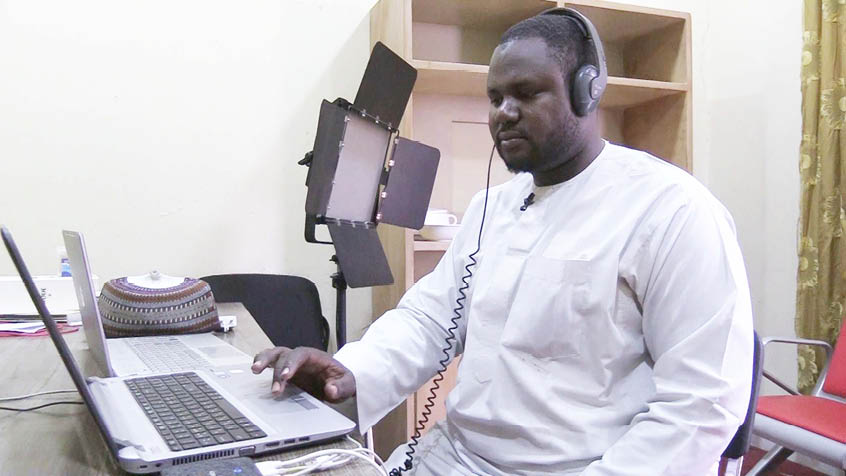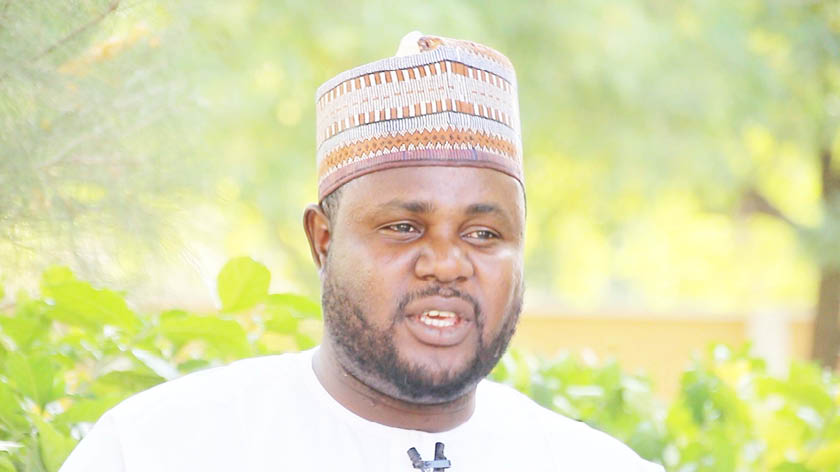Abubakar Isah Dandago, popularly known with his stage name as Yamalash, is a Kano-based football enthusiast-turn Hausa commentator.
Yamalash, born in the ancient Dandago community of Kano State in 1981, grew up with an interest in football from a tender age. He is a practising journalist who started his career from Freedom Radio in Kano as one of the pioneer staff and left in 2012 where he joined the foreign service of Radio France International as a correspondent in Kano.
The journalist/commentator is gradually gaining acceptance and popularity among the teeming population of football lovers, not only in Kano State where he started but the country and beyond. He is one of the only two contracted by the popular International Sports channel – Super Sport to offer Hausa commentary in the 2023 World cup held in Qatar.
His choice of the Hausa dialect and style of presentation is gradually attracting the attention of most Hausa-speaking people who are footfall enthusiasts. Most of them have testified that they prefer watching from his end as it gives them more sense of identification and belonging.
S’Court Judgement: NNPP, APC sign fresh peace accord in Kano
Pro-Yari senators not involved in plot against Akpabio – Kawu Sumaila
Speaking exclusively to Daily Trust Saturday about how he rose from just a football fan to becoming a journalist and subsequently gained ground in the sports circle, courtesy of obsession, he said it was surprising, even to him.
“I am currently a correspondent of Radio France International (RFI) in Kano State. I started watching football from a tender age. I developed the interest from five to six years of age. I can recall that I watched the 1990 and 1994 World Cup. That was when I started watching international football.
“In 1997, my attention went fully on football, where I was a supporter of the Manchester United; and till date, I am one of their biggest and loyal fans. However, people say that the way I treat them when commenting on their matches, they doubt if it is true.

“I started commentary in 2019 at a radio station in Kano, alongside my friend, Isma’il Abba Tangalashi. That’s what gave birth to what we are in the game of commentary today.
“Why I said so is that it is from that commentary that a well known sports channel, Super Sports, looked for us and we were taken to the last World Cup in Qatar, where we did commentary in Hausa language,” he said.
Dandago highlighted that his performance and promotion at the World Cup had been a point where his stars shot far and made him a shining celebrity among sports enthusiasts, especially the Hausa-speaking population.
“The words I am using are natural. Everything flows when I am into it.
“The styles have generated football fans’ attention because they feel at home; what they are watching is like being localised for them. Although it goes in line with what the English commentary is saying, they feel like it’s their own.
“You all know how football lovers act when they are watching. They give all their hearts and attention to it, not to talk of when it is interpreted in their own way and language.
“Some Hausa scholars oftentimes call and ask where I get those words from and I tell them that they are Hausa words I know, and they flow and fit in naturally. There is no preparation or research before I embark on it. I believe it is just a hidden talent in me that is now exploding,” he added.
Further speaking on how popular and engaging the trend is making him become, Yamalash pointed out that while the act is borne out of obsession, it is now gradually gaining ground and making him cut time out of his busy schedule to satisfy the urge of his teeming fans.
“As I said earlier, it is something I found out of obsession, not something I planned or wanted to do. Being a journalist alone is tasking; and I must say that this is becoming something else that is now taking up my time.
“I realised that people are always looking up to see me give them a new version of the commentary, so I made it a task that I must satisfy them by all means, at least by taking up time to do it.
“All I can say is to thank and appreciate God for the talent, and my supporters, who are encouraging me to keep it up. I had never thought it would be like this.
“Yesterday, an accident nearly occurred when people were matching sudden breaks in their vehicles to meet and greet me.
“In a day, at a time I meet 30 people who will snap pictures with me. Even people who are not into football have started developing interest.
“People call me, not only from Nigeria, to say they enjoy the way I am transmitting and taking the audience along, and that has really given them interest to start watching football. This is why, even if I am busy, I find time to do it since people are interested.
“It continued when I came back from Qatar and people were longing for the commentary. Not to disappoint them, I made it a task upon myself to continue, just to keep them entertained; at least, they are my fans and I owe them that.
“I usually do the commentary in my house, at studios of colleagues and wherever I find convenience; even in my car.
“The only challenges are calls and visits at a time when you are busy and at odd times. People would want to talk to you or meet you when they want and you can’t give them all that they are asking for,” he further said.
According to Wikipedia, a sports commentator, also known as sports announcer or sportscaster provides a real-time commentary of a game or event, usually during a live broadcast, traditionally delivered in the historical present tense.
Radio was the first medium for sports broadcasts, and radio commentators must describe all aspects of the action to listeners who cannot see it for themselves. In the case of televised sports coverage, commentators are usually presented as a voiceover, with images of the contest shown on viewers’ screens and sounds of the action and spectators heard in the background.
Television commentators are rarely shown on screen during an event, though some networks choose to feature their announcers on camera, either before or after the contest, or briefly during breaks in the action.

 Join Daily Trust WhatsApp Community For Quick Access To News and Happenings Around You.
Join Daily Trust WhatsApp Community For Quick Access To News and Happenings Around You.